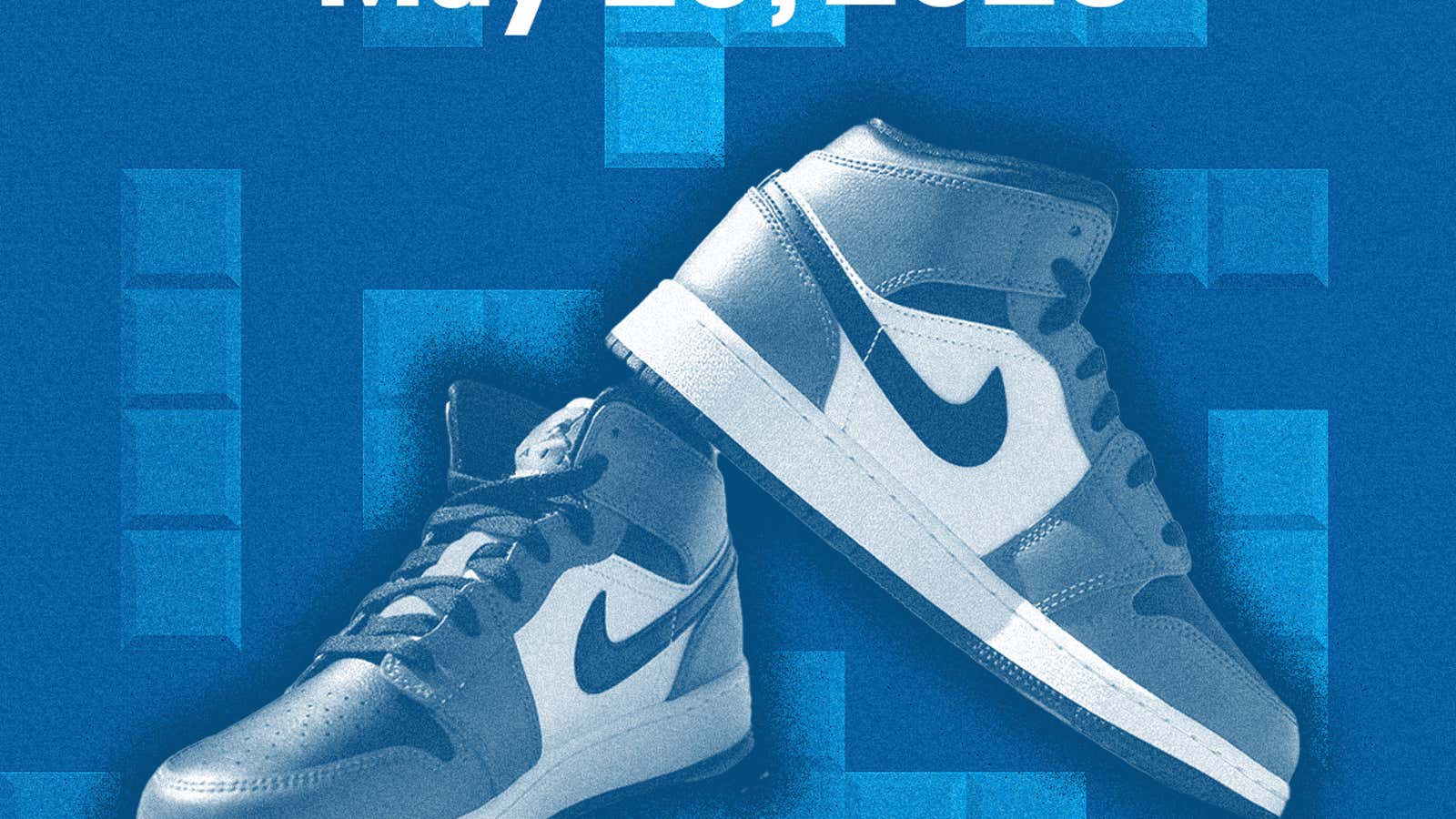Hi Quartz members!
If the boxy suits didn’t give it away, the soundtracks did.
In the movie Tetris: the Pet Shop Boys’ “Opportunities (Let’s Make Lots of Money)” and a remix of Bonnie Tyler’s “Holding Out for a Hero.” In BlackBerry: Elastica’s “Connection,” with the lines “Riding on any wave / That is the luck you crave.” And in Air, most straightforwardly: Dire Straits’ “Money for Nothing.”
These songs root these 2023 movies in a time period: the 1980s, sliding into the early 1990s. But they also function as anthems for what the movies celebrate. In Tetris, a video game executive travels into Soviet Russia to procure the rights to the wildly popular video game. In Air, a Nike executive manages to sign Michael Jordan to endorse a wildly popular line of shoes. In BlackBerry, phone company executives design a wildly popular cell phone. In Flamin’ Hot, another movie in this mini-genre, a Frito-Lay janitor-turned-executive invents the titular, wildly popular Cheetos snack. Hooray for the wild popularity of consumer products.
These are curious movies. They’re all paeans to a kind of entrepreneurial ingenuity, which is perhaps dramatic in some way, although not always. But they’re also loosely fictionalized stories of processes without any obvious cinematic appeal. In Air, the Nike executive (played by Matt Damon) makes plenty of phone calls. In Tetris, there’s a lot of guff about the kinds of copyright available on a video game. Flamin’ Hot is about an idea for a spicier flavor of corn puff. In all of them, mid-level executives make their rich companies richer. The acting is lukewarm. This is not the stuff of gripping elevator pitches.
But the movies got made, and they got made now, which says something about their relation to the modern moment that is, really, far more interesting than the dialogues in the movies themselves.
1. THE CYNICAL TAKE
The products in these movies are also brands, and brands have loyalists. “I feel sort of dirty saying it, but it’s about brand recognition,” Jon S. Baird, the director of Tetris, told the Los Angeles Times:
Ultimately you want as many people to see your film as possible. And I think that when you do a film about an existing product, you’ve automatically got a built-in audience, and that helps in the marketing and that helps in the audience awareness. It lights a little kernel of interest in what they’re maybe going to see next, whether it’s on streaming or whether it’s in the movies.
Another “cynical answer,” said Matt Johnson, the director of BlackBerry, is “that the [intellectual property] chain of title on all these products is a lot easier to pitch to money people, and because everything is about IP—you’re either basing a movie on an article or a book or something—of course the people at [agencies like] CAA and William Morris, etc., were like, ‘Well, wait a minute, what about products?’ And so I think this is just the beginning of what is probably going to be a flood, provided there’s a market interest.” In other words: expect movies about the lightbulb moment behind acid-washed Levi’s, a musical about the invention of the Sony Walkman, and the saga of how a hero brought Cabbage Patch Kids to the market.
2. THE NOSTALGIC TAKE - I
All four movies were composed in the key of nostalgia—but nostalgia for what, exactly? Perhaps for a time avant China, when Western companies comfortably ruled the global economy? And when the most dynamic businessmen had a distinctively American zeal—even if they were Canadian, as in BlackBerry, or acting on behalf of a Japanese company, as in Tetris?
In Air, Damon gets to give the plump inspirational speech: two minutes to sell Jordan on his endorsement contract, during which the music swells and eyes grow moist. Jordan’s story, Damon’s character says, “is an American story, and that’s why Americans are going to love it. People are going to build you up... Because when you’re great and new, we love you... You’re going to change the fucking world.” Is he still talking about Jordan? He may as well be referring to Nike, before it faced problems with fake shoes and labor abuse allegations. Or to the American corporation circa the 1980s and the 1990s, just as the US was winning the Cold War—and just as China’s meteoric rise was around the corner.
3. THE NOSTALGIC TAKE - II
Maybe the nostalgia they’re after is that of the heyday of a particular mode of capitalism, in which companies manufactured things that we could eat, wear, or play. (American manufacturing, in particular, suffered after the era depicted in these movies; between 2000 and 2010, the US lost a third of its manufacturing jobs.) The subsequent decades have been dominated by other ways to make bank: financializing the economy and building ubiquitous software. In both cases, the nuts and bolts elude the lay movie watcher. Cheetos, though? That, we get.
Or was the nostalgia, really, for the last few years of faith in corporate capitalism? Its victory in the Cold War should have bolstered that faith. Instead, as the environment degraded, corporate greed surged, and inequality widened in the US and elsewhere, the sheen wore off. The prime actors of capitalism today are seen as bullying and cold-hearted. The movies cast their Horatio Alger heroes as plucky, passionate individuals, and their work as wholesome and good. If capitalism ever needed puff pieces, it now has them.
🎧 Podcast interlude

But, let’s go back to the future for a second. It’s 2023, in case you hadn’t heard, and among all the things it feels like we really should have figured out by now, two stand out to us:
🧴Single-use plastic: It’s often the consumer’s duty to figure out what to do with a plastic product, but what could manufacturers do—and what should they be told to do—to make a real dent in the problem?
🗳️ Online voting: Casting a ballot from one’s own device would theoretically increase participation, but it’s a lot more complicated than it sounds. Will we get there in our lifetimes?
Listen to the latest two episodes of the Quartz Obsession podcast—out now!
✅ Subscribe wherever you get your podcasts: Apple Podcasts | Spotify | Google | Stitcher | YouTube
4. THE 💲 THING
In a crime movie, we champion the detective; in a sports movie, the underdog. But these movies are about people who want to make more money.
Idolizing those who grow rich is, in and of itself, not unusual as a Hollywood trope. But the specific mechanics of it here—transpiring within the middle rungs of a corporation, as a cog in the machine does its duty—are distinct from Entrepreneur Dramedies like Jobs, Julia, or Minx.
Aside from the nostalgia economics working out nicely, movie studios are capitalizing on these cog heroes because that’s who they must think we want. The fault, dear reader, is not in our movie stars but in ourselves.
Thanks for reading! And don’t hesitate to reach out with comments, questions, or topics you want to know more about.
Have a bodacious weekend,
—Samanth Subramanian, global news editor
